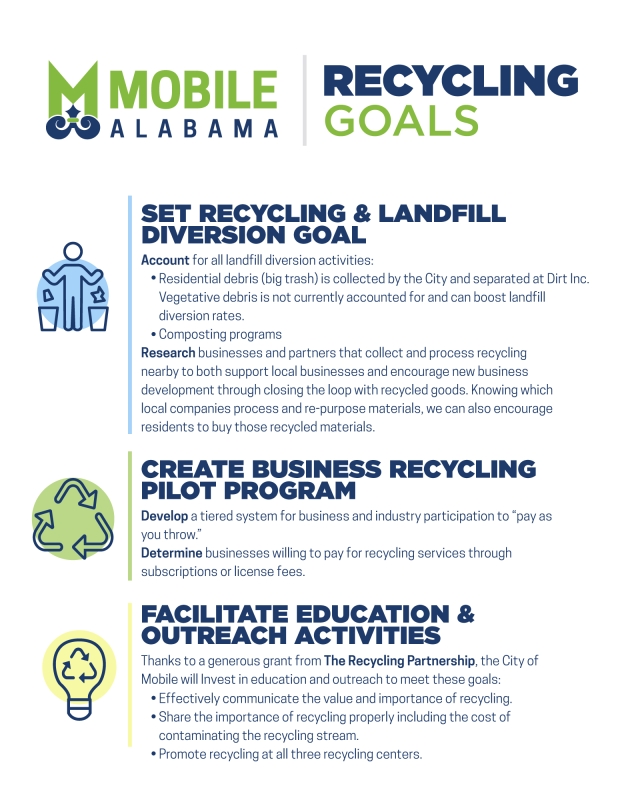The City of Mobile is committed to recycling as a part of being the most business and family friendly city in America.
In the fall of 2021, the City of Mobile hired the University of South Alabama Polling Group to survey residents to determine their willingness to recycle as well as their reasons for not recycling. The overwhelming response was that 90% of respondents see recycling as somewhat (20%) or very important (70%). 56% of the respondents stated that they currently recycle. The top reasons for not recycling are lack of convenient access (60%) and lack of information (47%). One additional note from the survey is that 62% would be interested in curbside recycling.
After learning what our community members want, we applied for funding from the ADEM’s Alabama Recycling Fund Grant program to do the following: 1) expand our existing drop-off recycling program; 2) undertake a Mobile County-wide study of the opportunities available to expand recycling for all Mobilians; and 3) create an education/marketing program to promote recycling.
The City of Mobile leveraged $190,000 from the ADEM Recycling Grant plus
additional funds from the City’s general fund to add a 3 Single Stream Drop Off
Recycling Centers in Mobile. You can find all the details about where and what to
recycle HERE.
The County-Wide Feasibility Study is here. The City of Mobile decided to focus on
these efforts:

And with special thanks to The Recycling Partnership and their partners, American
Beverage Association, Alabama Beverage Association, every City of Mobile citizen
will receive information about when, where, and what to recycle.
Glass - Glass is infinitely recyclable, but the City of Mobile has made a decision to stop allowing it to be
added to the Single Stream Recycling Program. Cost, environmental impact, and recyclability impacts are
all included in the reasoning.
1) Cost: The City pays a per ton fee for our recycling. As the heaviest material collected at the city’s
recycling center, glass is the largest driver of the costs associated with sending recyclable
materials to Pensacola.
2) Environmental Impact: The nearest glass processor is just outside of Atlanta — more than 300
miles away. Carrying this heavy load over hundreds of miles means we can be running at cross
purposes.
3) Recyclability: Glass also wreaks havoc when it is in a single-stream compactor. Broken glass
breaks down conveyor belts and is difficult for the people sorting and separating recyclables. In
some rare cases, the inability to separate small pieces of glass can cause an entire load of
recyclable material to be thrown out.
Options -- The Mobile County Recycling Center on Hitt Road has and will continue to collect glass.
It is also in the process of purchasing a glass crusher to make the glass into usable products locally.
We encourage you to take them your glass. We will also continue to review this decision. If new glass
processors come into our area, or we can develop another way to collect the glass, we will be ready to
reopen the opportunity.
Energy Conservation
The most obvious reason to cut back on energy consumption is to save
money! Using less energy also reduces carbon emissions that play a significant role
in climate change, produces a higher quality of life, cleaner air quality, and an
overall healthier planet.
These are great tools for how to reduce your energy consumption.
Renewable Energy
Renewable energy is energy generated from natural
processes that are continuously replenished. Sunlight, geothermal heat, wind, tides,
water, and various forms of biomass all provide energy and the source cannot be
exhausted and is constantly renewed.
Solar panels can be added to your home, even in historic districts, to increase your
renewable energy use and decrease less sustainable energy. Talk to your energy
provider and companies that sell renewable energy to find out if this is a good
option for your family or your business.
The U.S. population has doubled over the past 50 years, while water usage has tripled. Recent droughts have emphasized the importance of conserving water with models projecting water shortages in at least 40 states by 2024. While the City of Mobile remains the city with the most rainfall in North America (65-67 inches), conservation of fresh, clean water is important.
By practicing some of the water-saving tips listed below, each of us can do our part to ensure an adequate supply of fresh water for ourselves and future generations. Conserving water not only helps save water supplies, but it also can save you money.
The following information provides general suggestions and ideas to use water, both indoors and outdoors, as efficiently as possible.
INDOOR USE
OUTDOOR USE
We are a city that drives and loves our cars. How we grow needs to encourage changes to that while honoring our culture and lifestyle. The City of Mobile will be developing a path to add electric vehicles to our fleet to help lead the way for our community and to test the range, longevity, maintenance requirements, and curb appeal for our staff.
Compared to driving cars, public transportation is incredibly sustainable, but only 5% of working people utilize public transit systems. Instead, they use their own vehicles to commute to and from their jobs. Understanding the benefits of sustainable transportation may encourage workers to utilize it. Whether it be your health, the Earth, the community, or your wallet, sustainable transit is better for them all. Mobile’s Wave Transit will become more mainstream as the number of riders increases, allowing systems to expand and create an even greater impact.
In this Section